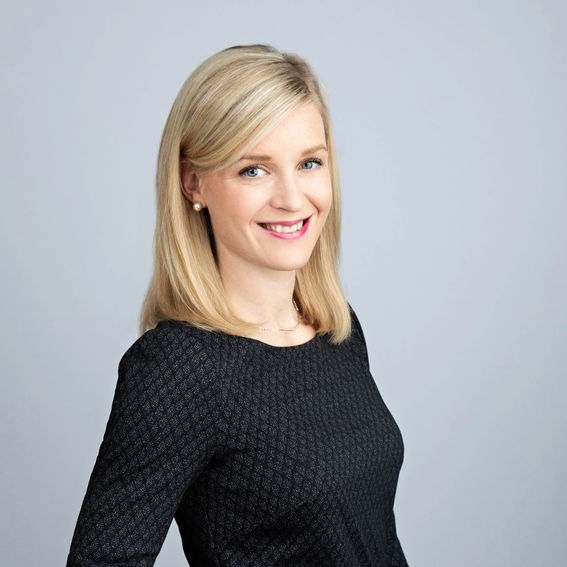Finance, Master of Science (Economics and Business Administration)
Dive into finance: learn to understand financial markets, manage risk and navigate global issues to face the latest challenges in the field.

I am a 33-year-old mother of two children who likes various sports. I find well-being and health themes interesting and motivating, and I currently work at Mehiläinen, related to these themes.
I studied at the School of Business between 2007 and 2012, majoring in finance. During my studies, I was active in the Student Union: I was responsible for social policy and sports in the KY Board, for example. As my minor subject, I completed exchange studies in Singapore, read business law, and studied development studies at the Faculty of Social Sciences of the University of Helsinki.
I chose my major between finance and economics. I wanted to study an analytical major, which provides concrete skills for working life. I think finance is interesting, but it was not my passion. However, I feel that the skills, operating methods, and contacts gained in my studies have been of great benefit to me in working life.
During my studies, I did various traineeships, because I wanted to see different alternatives and learn. I worked at Wärtsilä’s finance department, IBM's business development, and carried out consulting and mergers & acquisitions internships at Capgemini and KPMG. One of my internships was at the African Development Bank, where I got to work with microloans and coordinate finance projects in Ghana, Benin, Togo, and Mali.
After graduation, I decided to continue working in consulting because of its project nature, variability of work, as well as steep learning curve. I worked as a management consultant at EY, from where I moved to NHG (Nordic Healthcare Group) for social welfare and health care consulting. At NHG, I was able to work with both public and private social welfare and health care service actors in interesting projects as a consultant, project manager, as well as Senior Manager. At the beginning of 2019, I started to work at Mehiläinen, where my first position was being responsible for the digital development of working life services and corporate acquisitions (M&A).
Hanna Hovi, School of Business alumnaFor employment, it is important to be able to define for yourself, what you want to do on the basis of your own values and ideas.
I find working with social welfare and health care truly meaningful. Having been a consultant for some time, I wanted to work in a company, to be able to work more long-term on interesting themes. At Mehiläinen, I first worked on digital business development and acquisitions, but a year ago we saw the need to start investing more in mental health services, as mental health problems are a major societal challenge. Sickness absences and disability pensions due to mental health reasons are growing at a high rate, and the Covid-19 crisis further deteriorates the mental well-being of many population groups, such as children and young people. At Mehiläinen, we decided to make additional investments in this area, and since last spring I have led the open mental health services, where we strive to make high-quality services as accessible as possible for both private and occupational health care clients. One of the major problems in our society is that help is not sought until it is too late. For our part, we want to change this culture and make it easier to seek help and support, utilising also digital solutions and means of support.
I feel that my work is highly meaningful. Lately, my work has included a lot of new development, including strategic planning, acquisitions, pricing, recruitment, digital development, and planning of new services and indicators as well as marketing. A large part of my work is the implementation of new operating models, communicating about issues both internally as well as to customers, and listening to people. For the last year, I have mainly worked remotely. Physical encounters and brainstorming meetings have largely changed to take place through Microsoft Teams.
In my studies, I felt that different case exercises were particularly useful, especially in master's courses. The cases taught diverse skills required in working life, such as solving new problems on a fast schedule, group work, and an analytical approach, but also presenting findings in an understandable form. During my studies, I also participated in case competitions in Finland and abroad.
Business studies provide a good basis for working life and open up a number of doors to different career paths according to one’s own interest. The various contacts and networks that I created during my studies, have also proved important in my career. In fact, I have been actively in contact with many of my fellow students from the School of Business in working life.
During my studies, I was mainly involved in working life through part-time work and summer jobs. This was an excellent way of familiarising with different companies, tasks, and management styles. From every job - as from other life experiences - I have certainly learned something that is useful for the kind of person and employee I have developed into. I believe that my comprehensive work experience from various workplaces has made me understand, that you do not need any superpowers to cope with working life. In the end, it is about basic matters: To be reliable, to be curious about things, to be able to choose your battles and commit to them, and to treat other people well.
For employment, it is important to be able to define for yourself, what you want to do on the basis of your own values and ideas. When the direction is somewhat clear, it will be much easier to pursue towards it. Often, genuine interest shines through in recruitment processes and other encounters. I would also urge to openly articulate your interest and actively familiarise yourself with the 'right' people.
Personally, I feel that meaningfulness in working life is extremely important. However, it comes from different things for different people. For me, meaningfulness comes from the fact, that I feel that I am doing good things that change the world for the better in small steps, but also from the various encounters and atmosphere I create in my workplace every day.
Work takes up a significant portion of our time, therefore, it is desirable to find it meaningful in at least some level. Of course, there are various other ways to make life meaningful, such as family, friends, hobbies, or voluntary work. When looking for a job and meaningfulness, it is important to remember to have mercy on yourself: Nothing in life is perfect, and every moment or every decision cannot be meaningful. The key is to find a good enough, interesting, and meaningful workplace, where you can learn and develop in the right direction.
Find out more about Hanna's career path on LinkedIn!

Dive into finance: learn to understand financial markets, manage risk and navigate global issues to face the latest challenges in the field.

Here you can find School of Business alumni stories. Our alumni share their professional journeys and give advice and tips regarding working life. The stories have been sorted based on the alumni's majors.



